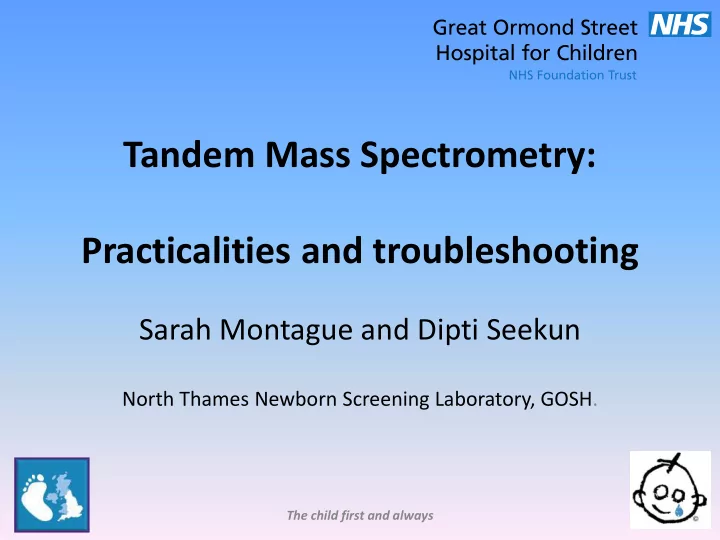

Tandem Mass Spectrometry: Practicalities and troubleshooting Sarah Montague and Dipti Seekun North Thames Newborn Screening Laboratory, GOSH. The child first and always
The Camelia Botnar Laboratories at Great Ormond Street Hospital For Sick Children • Our world-class teams play an essential role in the diagnosis and treatment of childhood illness • We are the largest Newborn screening centre in the UK and we screen 125,000 babies every year • 1 of every 6 babies born is screened at GOSH The child first and always
Experience Biomedical Scientists • Dipti – BMS1 at GOSH since December 2013. • Sarah – BMS1 at GOSH since August 2014. Department • One of six pilot sites for the expanded newborn screening programme. The child first and always
Analysis at GOSH Inherited metabolic disorder screening using the AB SCIEX API 3200 Tandem Mass spec • Phenylketonuria-PKU (Phe and Tyr) • Medium-chain acyl-CoA dehydrogenase deficiency-MCADD (C8:C10 Ratio) • Isovaleric acidaemia -IVA (C5) • Maple syrup urine disease -MSUD (Leu) • Homocystinuria-HCU (Meth) • Glutaric aciduria type 1-GA1 (C5DC) The child first and always
Methodology Shimadzu AB SCIEX Pressure API 3200 LC/MS/MS Tower CTC Analytics LEAP HTS PAL AutoSampler HTC LC HPLC The triple Quadrupole API 3200 SYSTEM The child first and always
Common Problems & Troubleshooting The child first and always
Types of problems • Pre-analytical Sample contamination, insufficient, multi-spotted or compressed spots. • Analytical • Post analytical Transcription errors. The child first and always
Maintenance Maintenance logs The child first and always
Maintenance Performing the weekly maintenance Curtain plate Orifice Plate Skimmer The child first and always
Maintenance Delayed/Poor maintenance • Poor sensitivity/signal leading to failed internal standards caused by a drastic drop in Tandem performance • Poor chromatograms caused by air in lines or leaks • High pressures caused by blocked/pinched peek tubing or filters • Low pressures caused by loose peek tubing connections or wrong solvent in use • Discrepant results (Flyers) The child first and always
Good chromatogram Appropriate Sensitivity Peak shape Correct retention time Baseline The child first and always
Normal/good chromatogram Failed injection The child first and always
Failed injection • Inaccurate pipetting of internal standard- Short Sampled • Air in the lines • Blocked lines • Blocked rotor seal • Broken syringe • Slack bungee cord (operates syringe) • Insufficient mobile phase • Faulty chip on board sample manager The child first and always
Waste Line Rheodyne Area Line to TMS Sample Loop Mobile Phase The child first and always
A very broken sample syringe! The child first and always
Normal/good chromatogram Carry-over (False Positives) The child first and always
Carry-over Unreliable/biased results and false positives • Insufficient needle washing on board • Blockage in needle wash or waste line causing back-flow • PEEK tubing with loose connections • Leaking syringe The child first and always
I.T Issues • Communication problems between software and instrumentation. The child first and always
Final thoughts • Always perform maintenance • Keep records of pressure • Record problems in log and follow up • Call engineer if necessary The child first and always
Thank you for listening Any Questions? The child first and always
Recommend
More recommend